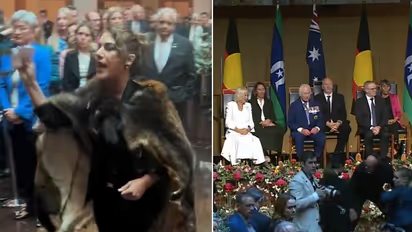'You are not our King, f**k the colony': Angry Australian senator Lidia Thorpe blasts King Charles III (WATCH)

Synopsis
During King Charles III’s first official visit to Australia as monarch, a public confrontation unfolded in Canberra when independent Senator Lidia Thorpe verbally attacked him, challenging his authority over the nation.
During King Charles III’s first official visit to Australia as monarch, a public confrontation unfolded in Canberra when independent Senator Lidia Thorpe verbally attacked him, challenging his authority over the nation. The outburst came after Charles delivered a landmark speech at Australia’s Parliament House, with Thorpe accusing the monarchy of historical atrocities against Australia’s First Nations people and demanding a treaty between the government and Indigenous communities.
As King Charles concluded his speech, Senator Thorpe, a staunch advocate for First Nations rights, stood up and directed a fiery statement towards the monarch. “You are not our King. You are not Sovereign… you have committed genocide against our people,” she shouted. Thorpe continued, calling for the return of Indigenous lands and urging for a formal treaty. “Give us our land back. Give us what you stole from us… our bones, our skulls, our babies, our people. You destroyed our land. Give us a treaty. We want a treaty in this country. You are a genocidalist,” she said, as she was gently escorted from the hall.
Her protest did not end there. Thorpe passionately reiterated her stance, shouting, “This is not your land, this is not your land, you are not my King, you are not our King. F**k the colony, f**k the colony, f**k the colony,” before being removed from the chamber.
The senator's protest, though brief, underscores growing tension surrounding Australia’s colonial history and its ongoing relationship with the British monarchy. Thorpe, a member of the Australian Senate’s upper house, has long been an outspoken critic of the British Crown and the impact of colonization on Indigenous Australians. Ahead of the royal visit, she had issued a statement calling for treaty negotiations between First Nations people and the Australian government, accusing the Crown of invading Australia without seeking a treaty and committing genocide.
“As First Peoples, we never ceded our sovereignty over this land. The Crown invaded this country, has not sought a treaty with First Peoples, and committed genocide of our people. King Charles is not the legitimate Sovereign of these lands,” Thorpe said in her statement prior to the protest. She added that any move towards establishing Australia as a republic must prioritize a treaty with Indigenous communities, warning that a republic without addressing the injustices of the past would be insufficient.
Despite the confrontation, it is understood that King Charles remained unperturbed and chose not to let the outburst overshadow his visit. The royal party reportedly viewed the day as a success, having spent much of it greeting hundreds of well-wishers outside the Australian War Memorial in Canberra, including an encounter with a sneezing alpaca that charmed the crowd.
This public confrontation comes as Australia’s government, led by Prime Minister Anthony Albanese, contemplates a referendum to break ties with the British monarchy and transition to a republic. Albanese, who has long advocated for republicanism, placed these plans on hold after last year’s referendum, which sought to give greater political representation to Indigenous Australians, was decisively rejected by the public.
The royal visit has also sparked several low-key protests from Indigenous rights advocates, with banners reading “decolonize” being displayed at various events attended by King Charles and Queen Camilla. These protests, though peaceful, reflect the ongoing struggle for recognition and reparations for First Nations communities, who continue to grapple with the legacy of colonization.
Check the Breaking News Today and Latest News from across India and around the world. Stay updated with the latest World News and global developments from politics to economy and current affairs. Get in-depth coverage of China News, Europe News, Pakistan News, and South Asia News, along with top headlines from the UK and US. Follow expert analysis, international trends, and breaking updates from around the globe. Download the Asianet News Official App from the Android Play Store and iPhone App Store for accurate and timely news updates anytime, anywhere.